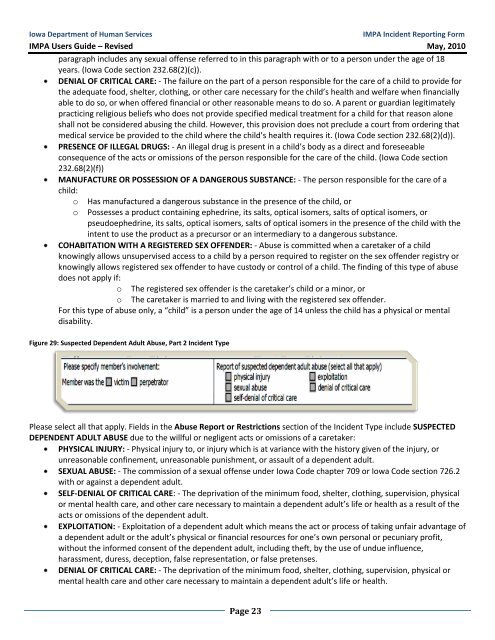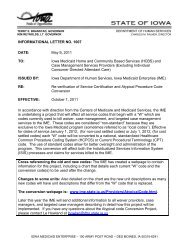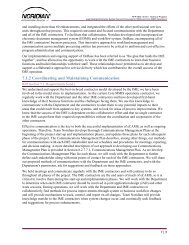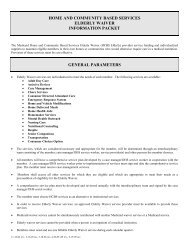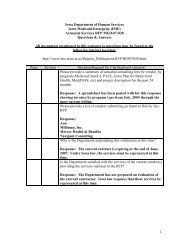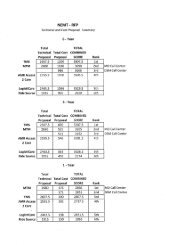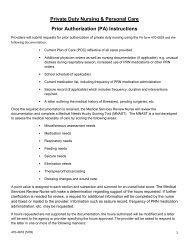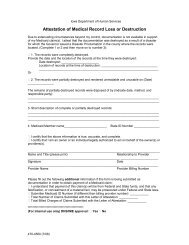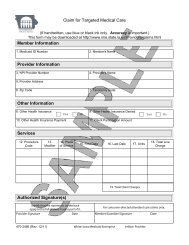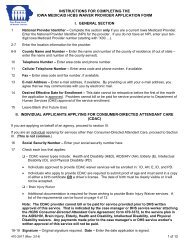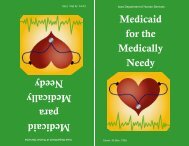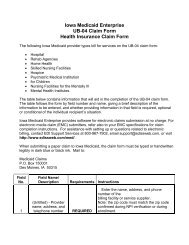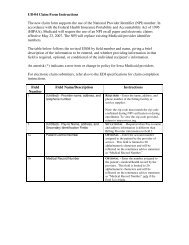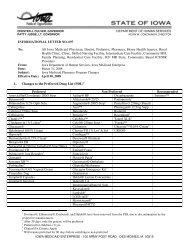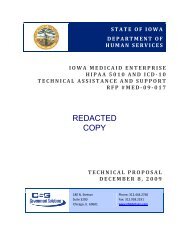Critical Incident Report User Guide Form 470-4698 - Iowa Medicaid ...
Critical Incident Report User Guide Form 470-4698 - Iowa Medicaid ...
Critical Incident Report User Guide Form 470-4698 - Iowa Medicaid ...
- No tags were found...
Create successful ePaper yourself
Turn your PDF publications into a flip-book with our unique Google optimized e-Paper software.
<strong>Iowa</strong> Department of Human ServicesIMPA <strong>Incident</strong> <strong>Report</strong>ing <strong>Form</strong>IMPA <strong>User</strong>s <strong>Guide</strong> – Revised May, 2010paragraph includes any sexual offense referred to in this paragraph with or to a person under the age of 18years. (<strong>Iowa</strong> Code section 232.68(2)(c)).DENIAL OF CRITICAL CARE: - The failure on the part of a person responsible for the care of a child to provide forthe adequate food, shelter, clothing, or other care necessary for the child’s health and welfare when financiallyable to do so, or when offered financial or other reasonable means to do so. A parent or guardian legitimatelypracticing religious beliefs who does not provide specified medical treatment for a child for that reason aloneshall not be considered abusing the child. However, this provision does not preclude a court from ordering thatmedical service be provided to the child where the child’s health requires it. (<strong>Iowa</strong> Code section 232.68(2)(d)).PRESENCE OF ILLEGAL DRUGS: - An illegal drug is present in a child’s body as a direct and foreseeableconsequence of the acts or omissions of the person responsible for the care of the child. (<strong>Iowa</strong> Code section232.68(2)(f))MANUFACTURE OR POSSESSION OF A DANGEROUS SUBSTANCE: - The person responsible for the care of achild:o Has manufactured a dangerous substance in the presence of the child, oro Possesses a product containing ephedrine, its salts, optical isomers, salts of optical isomers, orpseudoephedrine, its salts, optical isomers, salts of optical isomers in the presence of the child with theintent to use the product as a precursor or an intermediary to a dangerous substance.COHABITATION WITH A REGISTERED SEX OFFENDER: - Abuse is committed when a caretaker of a childknowingly allows unsupervised access to a child by a person required to register on the sex offender registry orknowingly allows registered sex offender to have custody or control of a child. The finding of this type of abusedoes not apply if:o The registered sex offender is the caretaker’s child or a minor, oro The caretaker is married to and living with the registered sex offender.For this type of abuse only, a “child” is a person under the age of 14 unless the child has a physical or mentaldisability.Figure 29: Suspected Dependent Adult Abuse, Part 2 <strong>Incident</strong> TypePlease select all that apply. Fields in the Abuse <strong>Report</strong> or Restrictions section of the <strong>Incident</strong> Type include SUSPECTEDDEPENDENT ADULT ABUSE due to the willful or negligent acts or omissions of a caretaker:PHYSICAL INJURY: - Physical injury to, or injury which is at variance with the history given of the injury, orunreasonable confinement, unreasonable punishment, or assault of a dependent adult.SEXUAL ABUSE: - The commission of a sexual offense under <strong>Iowa</strong> Code chapter 709 or <strong>Iowa</strong> Code section 726.2with or against a dependent adult.SELF-DENIAL OF CRITICAL CARE: - The deprivation of the minimum food, shelter, clothing, supervision, physicalor mental health care, and other care necessary to maintain a dependent adult’s life or health as a result of theacts or omissions of the dependent adult.EXPLOITATION: - Exploitation of a dependent adult which means the act or process of taking unfair advantage ofa dependent adult or the adult’s physical or financial resources for one’s own personal or pecuniary profit,without the informed consent of the dependent adult, including theft, by the use of undue influence,harassment, duress, deception, false representation, or false pretenses.DENIAL OF CRITICAL CARE: - The deprivation of the minimum food, shelter, clothing, supervision, physical ormental health care and other care necessary to maintain a dependent adult’s life or health.Page 23


